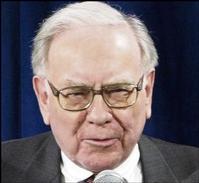Thomas S. Mulligan and Maggie Farley, Contributors

Berkshire Hathaway chief executive, Warren Buffett, speaks in New York in this February 25, 2004 file photo. - REUTERS
NEW YORK (Los Angeles Times):
WHEN THE world's second-richest man signed the bulk of his fortune over to the world's richest man's foundation on Monday, Bill Gates (No. 1) quipped to Warren E. Buffett (No. 2): "I didn't see your hands shaking there."
The signing ceremony for the largest charitable bequest in history took place, appropriately, in a marble-lined room at the august main branch of the New York Public Library, which itself is the product of several storied fortunes, including those of John Jacob Astor and Andrew Carnegie.
Afterward, Buffett remarked to an audience of several hundred philanthropists, scientists, students and United Nations officials that it is far easier to make a fortune than to decide how to give it away.
PHILANTHROPY TOUGH GAME
"In business, you look for the easy things to do,'' said Buffett, founder of Berkshire Hathaway Inc. and long considered the world's leading investor. "In philanthropy you are really tackling the problems that people of intellect, people with money have thought about in the past, and have had a tough time coming up with solutions. So philanthropy is a tougher game."
But he was smiling as he signed letters committing about $31 billion to the Bill and Melinda Gates Foundation and smaller amounts - though still denominated in billions - to four foundations set up in the names of his three children and deceased wife. "The first three letters are easy to sign," Buffett said. "I just sign, 'Dad'."
The unveiling of Buffett's charitable intentions was orchestrated for maximum publicity. First came a story Sunday on the Fortune magazine Website (penned by Fortune editor-at-large and Buffett confidante Carol J. Loomis), which led to front-page play around the world in Monday's newspapers.
More than 200 journalists thronged a function room at a midtown Manhattan hotel after the library signing ceremony for the Monday afternoon news conference, featuring the Gateses and Buffett. An interview with Buffett on the Charlie Rose show Monday night capped off the media blitz.
Microsoft Inc. co-founder Bill Gates said the point of the publicity was to help coax "more of the people who are super-lucky to get involved" in philanthropy.
While media-tycoon-turned-philanthropist Ted Turner once attempted to spark more giving "by kind of scolding people,'' Gates said his own method was "showing how much fun it can be."
IMPROVING EDUCATION
Melinda Gates, though lesser known than her husband or the investing 'Wizard of Omaha', proved herself their equal as a speaker, forcefully explaining how the Gates Foundation had decided to expand its focus. The main missions will continue to be improving United States education and international health, she said, but the foundation recently decided to move into biotechnology and agriculture and 'micro-lending' in the Third World.
"When you see people standing in line in Zambia for tuberculosis medicine and they can barely swallow it," she said, "it becomes obvious that they need help developing economically and agriculturally to sustain whatever health the medicines may provide."
In a 45-minute question-and-answer session, Buffett outlined the long-held beliefs that shaped his decision to give almost all his fortune away.
"I don't believe in creating dynastic wealth," he said, adding that it made no more sense for his children "to inherit my position" atop a gigantic fortune than for them to inherit a slot on the Olympic team or as quarterback of the University of Nebraska football team had their father been an athlete.
Buffett said his philosophy was to "leave the kids enough so they can do anything but not enough so they can do nothing."
An Italian journalist asked whether Buffett had considered leaving his money to the U.S. government, which already is organised to address societal ills. The question got a laugh, but Buffett took it seriously, saying he thought the Gateses had shown a greater ability to maximise the per-dollar benefits ``than if you dropped it into the federal treasury."
Buffett dwelt a bit on how he felt much of his wealth came from his fortune of being born in America at the time he was, and that he should share it with those who did not strike it lucky.
``I won the lottery the day I was born,'' he said. ``I had terrific parents, I had a good education, I was wired in a way that paid off disproportionately in this particular economy. If I had been born long ago, or born in some other country, the wiring I had would not have paid off the way it has. I'm lucky that I accumulated it, and all along, I felt like it should go back to society.''

